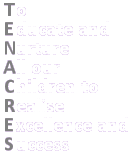Subjects
On this page you can learn all about the subjects that make up the curriculum here at Tenacres.
English
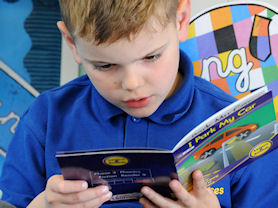
We love to read!
All children at Tenacres are encouraged to develop and apply their literacy skills across the curriculum, as most of our English lessons include meaningful topical links.
We set and expect high standards of achievement in writing. Grammar, punctuation, spelling and handwriting are taught throughout the school in both designated English lessons and cross-curricular contexts. Opportunities for writing are prolific, encompassing stories, poetry, letter-writing, reports, news and investigation write-ups.
Throughout the school we also teach and develop speaking and listening skills through group work, discussions and debates.
Also see our English Policy on our Policies page.
Reading
Children follow a progressive reading system throughout the school, reading books that match their needs and capabilities. We use books from a range of schemes to allow children a wide choice, from which they are encouraged to take home daily or as required. Sometimes children’s choice of reading books may be teacher directed but more often the children choose books for themselves.
In addition to individual reading, we also use guided reading to develop comprehension and inference skills within a group or whole class work.
Each child is given a Tenacres Home School Diary which includes pages for reading records. In here, parents, pupils and teachers can comment on a child’s particular efforts and achievements within the books and texts they are reading. The overall progress of children is carefully monitored by their teacher.
Also see: Progression for Reading Bands
Phonics
In Foundation Stage and Year 1, all our children receive daily phonics sessions to build the essential skills for reading and writing.
Key skills include:
- Letter sound recognition
- Blending sounds to read
- Segmenting words to spell
- Recognition of key words
This is done through a multi-sensory approach, combining the Letters and Sounds program with Jolly Phonics.
We also have phonics programs in place to support children beyond Year 1 who will benefit from them.
Following on from phonics, No-Nonsense Spelling is taught through Years 2-4, continuing to embed spelling rules.
Also see: Letters and Sounds Phonics Programme
Library
Our Tenacres library is well stocked with a wide range of fiction and non-fiction texts. Children visit on a weekly basis to choose books to take home. The library is also used to support teaching of text types in English lessons.
Maths
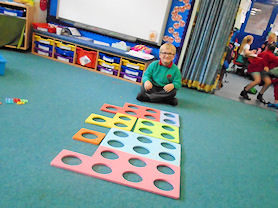
Numicon problem solving in Reception.
At Tenacres First School our aim is to give all children a positive and fun experience of Maths based firmly around the National Curriculum’s aims of fluency, reasoning and problem solving.
We place strong emphasis on mastering key skills such as addition, subtraction, multiplication and division.
Our lessons are based upon this approach:
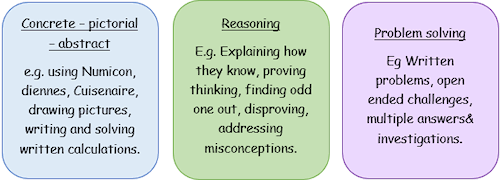
We use a range of different resources e.g. Numicon, diennes and Cuisenaire to help children develop a solid understanding of number. In addition to Maths lesson, each class has at least 5 mental maths sessions per fortnight to allow them to become fluent and efficient with mental strategies. As part of mental maths sessions, children in Years 2 to 4 take part in Times Tables Rockstars to help improve their accuracy with times tables. Each child has access to this at home to encourage them to practice.
We have developed our own calculation policy to ensure we are teaching in a consistent and progressive way and also use the White Rose, NCETM and I See Reasoning ideas to help structure our delivery of the maths curriculum. Work is differentiated to ensure children are challenged at a level that is appropriate for them.
If any pupils need extra support in Maths we offer a range of interventions including Breaking Barriers. Any children who are showing greater depth qualities are given a range of challenges to ensure they are stretched and can reach their full potential.
We aim to support children’s learning and to make it as exciting and relevant as possible which we do by involving them in such activities as World Maths Day, Outdoor Maths Week, making links to other curriculum areas and saving their money in the HSBC/Tenacres School Bank.
At Tenacres we encourage parents and carers to support their children by practising counting, number bonds, addition and subtraction facts, time, money and multiplication tables where appropriate.
Also see our Calculation Policy, Mathematics Policy, Mental Maths progression and EYFS Number Policy on our Policies page.
Also see: SMSC/Cultural Capital and British Values in Maths
Science
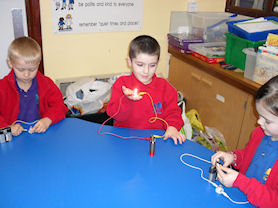
Group scientific experiments.
During Science teaching, our aim is to foster a child’s curiosity, interest and independent investigation skills.
At our school, we teach cross-curricular Science as much as possible so that children are able to link their topic and learning to real experiences with real-life applications. All lessons are planned with curriculum objectives in mind but will be adapted to apply to the children’s needs and interests.
At Tenacres we are lucky to have a vast array of resources to help the children learn about Science in a fun and interactive way. We believe Science has to be hands on, enjoyable and purposeful. We also make great use of our school grounds in order to study plants and animals in their natural habitat and the local environment.
As the children progress through the school, they begin to record their work in many ways, including graphs, diagrams, photographs and written investigations with predications. Despite this increase in written methods of recording, our children enjoy Science in a practical and purposeful way.
Art and Design
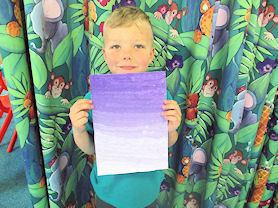
Experimenting with colour and exploring tints.
At Tenacres, we aim to create opportunities for children to explore their creativity and imagination in engaging and inspiring lessons. To create meaningful learning opportunities, we embed Art and Design within our topics.
As a school, we aim to provide children with a chance to develop a wide range of skills such as sketching, painting and printing before creating an end piece. The progression of skills should be clear within the children’s sketch books and the skills should be evident in the finished product. We strive for each child to have opportunity to deepen their skills by allowing enough time to learn a skill before applying it. As the children move through school they begin to build up a range of skills and techniques that they are familiar with and able to use.
Children have many opportunities to explore a range of media and develop control of a variety of tools and techniques. We also introduce our children to the work of artists, craft makers and designers from a variety of cultures both past and present.
We encourage our children to evaluate and reflect both with their own work and the work of others. We believe that as well as helping them to appreciate the development of art, it will also encourage children to show respect for the work of others.
Above all, Art and Design at Tenacres provides an opportunity for our children to express themselves through their creations. Both the children and adults are proud of the work produced and the art work seen around school is a true reflection of the progression of skills taught beforehand.
- Art and Design Intent
- Art and Design Implementation and Impact
- Art and Design Progression of Knowledge and Skills
Computing
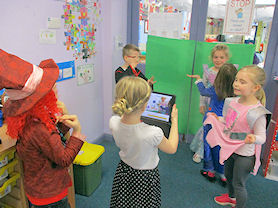
Creating stories using the green screen.
At Tenacres we are driven to deliver an education that develops life-long learning and provides our children with the knowledge and skills they will need for life after school. Computing plays an essential part in this.
Our Computing Curriculum is taught to secure and deepen a range of computing skills. These skills are built upon year on year, where children will emerge accomplished in many aspects of computing. Our curriculum consists of key strands to ensure it is broad and balanced:

We also use technology to enrich the learning experience. This could be through fully immersive experiences; by actively involving learners in lessons using interactive whiteboards which are situated in every classroom; by encouraging pupils to apply skills they learnt as part of computing units of work in other areas of the curriculum (creating a videos, songs); or using our cameras, programmable toys and iPads to support learning (using the Green Screen etc).
We empower our pupils through our Digital Leaders / Expert Helper program where pupils make decisions for: looking after iPads and ICT Suite; help make decisions about our curriculum; are online safety advocates; or simply help fix any problems.
Design Technology (DT)
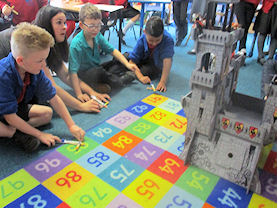
Creating and testing catapults.
Through the teaching of DT we aim to stimulate the children’s creativity and provide them with opportunities to explore a range of ideas, tools and media. As a school, DT is embedded within our curriculum to ensure the children learn within meaningful and relevant contexts.
At Tenacres, we provide children with time to design their product, allowing them time to draw on existing knowledge and we also encourage children to take risks. Learners draw on past experiences with either the media or the end product which influences their designs.
When creating a product we encourage children to be adventurous and we also insist that our children are resilient when things don’t go to plan. As learners progress they evaluate and are able to make changes to designs to resolve any problems.
We ensure that our children think realistically about their end goal and we encourage children to evaluate finished products and think of ways to improve them.
At all stages we encourage children to think carefully about their work and make the children aware of any health and safety issues they may face.
As a school we strive to help our children develop a deeper understanding and awareness as they move through school and it is evident that previous projects influence and inspire the way they create their next.
Our children develop a range of practical skills through using a range of materials and equipment including sheet materials, moulding materials, fabrics, construction kits, tools and a kitchen environment. The activities that we plan encourage children to draw upon skills from maths, computing, art and science.
- Design Technology Intent
- Design Technology Implementation and Impact
- Design Technology Progression of Knowledge and Skills
Geography
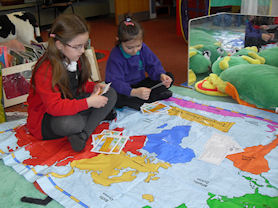
Learning about maps.
Through the teaching of Geography we encourage our children to develop an interest in the world around them and help them to understand that we have a responsibility to care for both our immediate environment and also the wider world. We harness caring attitudes towards the Earth and we hope to inspire children to protect it for the future.
As well as teaching children to care for the world, we look at many diverse places, human and physical features, physical processes and our children partake in a wide range of fieldwork studies. The children are provided with a range of opportunities to learn key skills through fieldwork, such as using a compass or a map. We are also extremely lucky to have access to a range of technologies which allow us to learn more about other parts of the world.
To ensure all children have the opportunity to deepen their knowledge of the world beyond their locality, we aim to create exciting and engaging learning opportunities that encourage all children to want to learn more. As the children move through school they will develop a deeper understanding as geographical language becomes embedded, they learn to appreciate diversity, accept a responsibility to care for the Earth and they continue to work on and improve key skills as they move through school.
History
At Tenacres we foster enthusiasm, curiosity and enquiry about the history of our local area, of Britain and of the wider world. We recognise that the skills our children develop in History lessons are important skills they will need for life; we are preparing children for living and working in the contemporary world and the world of the future
We aim to:
- Provide an engaging history curriculum which is broad, balanced, relevant and differentiated.
- Develop a sense of time by placing events, people and changes within a chronological framework.
- Develop the skills of enquiry and evaluation.
- Develop a knowledge of the characteristics of people living in particular periods, including attitudes and beliefs and their social, cultural, religious and ethnic diversity.
- Identify different ways in which the past is represented and make thoughtful use of a variety of sources.
- Develop the ability to describe and analyse reasons and results of events, situations and changes studied.
- Make links between different periods studied.
- Encourage children to interpret, explain and ask historical questions e.g. Why did this happen? How do we know this is true?
- Enrich the lives of our children through history focused trips, visitors and themed weeks.
Our pupils gain a progressively deeper understanding and competency of historical skills as they move through the school and the curriculum. Homework is used as an opportunity for further research and challenge.
Here at Tenacres, you will see children role playing as Egyptian Pharaohs and dancing like Romans in the playground. This love of history is the result of a rich and engaging curriculum that is informed by the National Curriculum and led by our children’s needs and interests.
"I believe that the more you know about the past, the better you are prepared for the future." - Theodore Roosevelt
Modern Foreign Languages (MFL)
Here at Tenacres First School we are currently focussing on one language pathway - French. This enables children to move on to Middle School with a good understanding of the language which they continue to develop there. Year 3 and 4 children have French taught weekly. Years 1 and 2 are not required to learn a foreign language however if topics allow and is relevant, their class teacher may choose to introduce it.
In order to follow the new 2014 National Curriculum, we teach through a variety of methods including, songs, puppets, acting out scenarios, conversations, written activities and listening games. French is taught through a cross curricular approach, whereby it is linked to the year group or class’ theme as closely as possible. We have found this only encourages engagement in the language and can then be followed up and linked with other areas of the curriculum. We not only teach French each week but class teachers are encouraged to promote the love of languages through using French at different times throughout the week e.g. carrying out the register, asking how someone is and giving basic commands such as ‘Merci’ and ‘écoute’.
Although we formally teach French, other languages are additionally promoted around school through the topics and themes we cover throughout the year, incorporating the love of our heritage languages.
Music
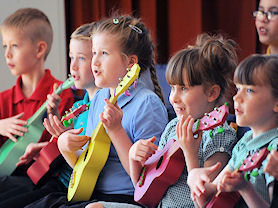
Playing the ukulele.
Music is an integral part of children’s learning at Tenacres.
Each class has use of a fully equipped music room, with a selection of percussion, wind, string and keyboard instruments. Reception children also have their own instrument tables within the classroom environment. Mrs Longfils (music specialist) teaches music across the school.
Within lessons, every child develops their musical skills through performance, composition and aural appreciation of music. The whole school join together for a weekly singing practice.
In Years 2, 3 and 4 opportunities are given for children to learn to play a musical instrument including guitar, drums and keyboard. Children in these year groups can also join the school choir.
Children are given opportunities to perform in a variety of settings: in the community, at local theatres, in-school assemblies, musical plays and concerts.
By the time children leave Tenacres, they have been exposed to a wide repertoire of live and recorded music, ranging from traditional to the present day.
Physical Education (PE)
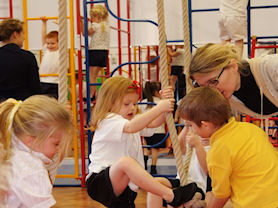
Using some of the apparatus in our School Hall.
The school enjoys the use of a good-sized sports hall, three playgrounds (two marked with teaching grids), a playing field and a wide range of apparatus and equipment for indoor and outdoor use.
We encourage all children to be active and aim to develop confidence and physical skills as the children grow stronger.
All children have two hours of PE timetabled per week and are taught skills fundamental for Dance; Games; Gymnastics and Athletics. Then in KS2 children are given the opportunity to take part in Outdoor and Adventurous activities and Swimming. They also take part in a range of tournaments and sports festivals both within school and with other schools throughout the year.
Children who succeed in out-of-school activities are encouraged to show their sporting trophies/awards and to display their sporting talents in our weekly Achievement Assemblies.
PSHE and Citizenship
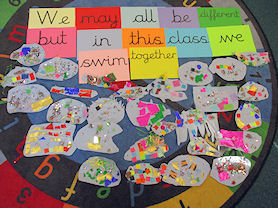
Some of our PSHE work..
The values and ethos of the school will not only be made explicit in PSHE, they will at times be shaped by what happens in PSHE.
Personal, social, health and economic education (PSHE) and Citizenship helps children to become confident, independent, healthy and responsible members of society. At Tenacres we encourage our pupils to take part in a wide range of activities, events and experiences that contribute to the life of the school and the wider community.
They experience the process of democracy through ‘TAPS’ Council (Tenacres Problem Solving Council). We teach them about rights and responsibilities. They learn to appreciate what it means to be a positive member of a diverse multi-cultural society.
We aim to equip our children with the knowledge, skills and understanding to enable them to:
- make informed choices and decisions
- develop good relationships
- have respect for others and their opinions
- become positive and active members of a democratic society
- to develop a growth mindset and face challenges positively, developing resilience, confidence and self-esteem
- be independent and responsible members of the school community.
Foundation stage:
PSED (Physical, Social Emotional Development) is one of the prime areas of learning and is central to teaching and learning across the Early Years curriculum. PD (Physical Development) is another prime area of learning and includes Health and Self Care.
The three Early Learning Goals for PSED are:
- Making relationships
- Self-confidence and awareness
- Managing feelings and behaviour
In Key Stage 1 and 2 we build on these experiences. All classes have a weekly PSHE/ Citizenship lesson. We follow Jigsaw, the mindful approach to PSHE. See below for an overview of the themes taught each half term. “Jigsaw is a unique, spiral, progressive and effective scheme of work, aiming to prepare children/young people for life, helping them really know and value who they are and understand how they relate to other people in this ever-changing world.” (Jigsaw website)
Fostering British Values is an integral part of our school ethos. Please see British Values listed under the ‘curriculum’ section.
- PSHE Jigsaw Overview
- PSHE Implementation and Impact
- PSHE Progression of Knowledge and Skills
- Jigsaw Information Leaflet for Parents
Relationships Education (RSE)
Religious Education (RE)
We follow the Worcestershire Agreed syllabus for Religious Education 2020-25.
Principal Aim: The principal aim of religious education is to explore what people believe and what difference this makes to how they live, so that pupils can gain the knowledge, understanding and skills needed to handle questions raised by religion and belief, reflecting on their own ideas and ways of living. (Worcestershire Agreed syllabus 2020-2025)
The threefold aim of RE elaborates the principal aim. The curriculum for RE aims to ensure that all pupils:
1. Make sense of a range of religious and non-religious beliefs, so that they can:
- identify, describe, explain and analyse beliefs and concepts in the context of living religions, using appropriate vocabulary
- explain how and why these beliefs are understood in different ways, by individuals and within communities
- recognise how and why sources of authority (e.g. texts, teachings, traditions, leaders) are used, expressed and interpreted in different ways, developing skills of interpretation.
2. Understand the impact and significance of religious and non-religious beliefs, so that they can:
- examine and explain how and why people express their beliefs in diverse ways
- recognise and account for ways in which people put their beliefs into action in diverse ways, in their everyday lives, within their communities and in the wider world
- appreciate and appraise the significance of different ways of life and ways of expressing meaning.
3. Make connections between religious and non-religious beliefs, concepts, practices and ideas studied, so that they can:
- evaluate, reflect on and enquire into key concepts and questions studied, responding thoughtfully and creatively, giving good reasons for their responses
- challenge the ideas studied, and allow the ideas studied to challenge their own thinking, articulating beliefs, values and commitments clearly in response
- discern possible connections between the ideas studied and their own ways of understanding the world, expressing their critical responses and personal reflections with increasing clarity and understanding
(Worcestershire Agreed Syllabus, 2020-2025)
- RE Curriculum Overview - 2021/22
- RE Implementation and Impact
- RE Progression of Knowledge and Skills
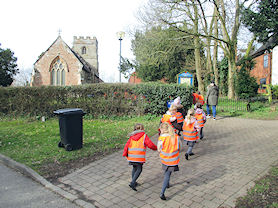 Year 1 visit to a church. |
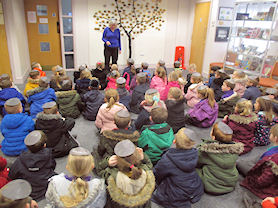 Year 2 visit a Synagogue. |

